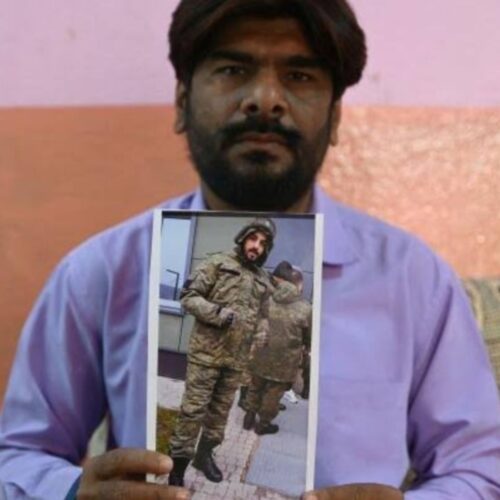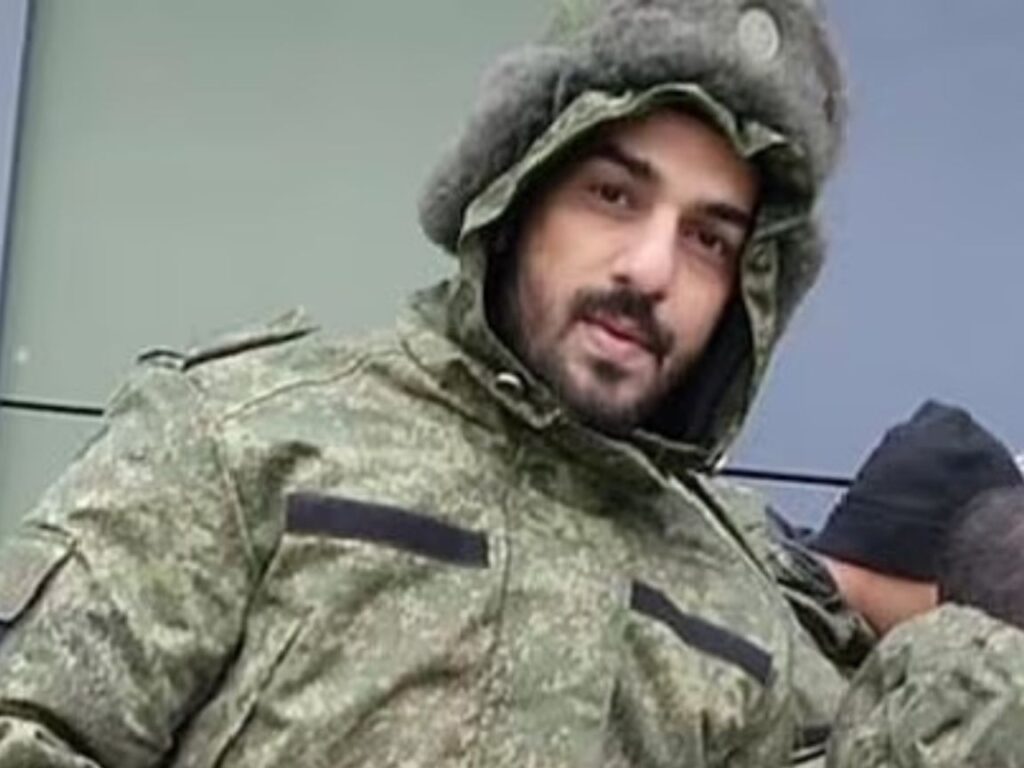From job seeker to victim: Indian man duped into war, dies in Russia
On December 31, we received a distressing call from Asfan. Through tears, he told us the agent deceived him into joining the war. Overwhelmed by fear and the grim reality at the border, where he witnessed daily casualties, Asfan expressed doubts about his survival.
- 2 years ago
May 7, 2024

HYDERABAD, India — When an agent recruited my brother Asfan to work in Moscow, Russia, he promised a starting salary of 45,000 rupees per month ($539 USD) and an eventual increase to $1,500 USD. This was a substantial sum for a labor-class family in India, and Asfan agreed.
When Asfan arrived in Russia, they unknowingly took him to a military camp near the Ukrainian border to fight alongside Russian troops. At the camp, Asfan witnessed a harrowing sight: men from India, Nepal, and Sri Lanka lay on the ground with gruesome injuries. Some had lost fingers, ears, legs, or had severe head wounds. He realized quickly, the recruiter tricked him and now he was trapped in a death chamber.
On December 31, 2023, Asfan called us from an unknown location near Ukraine. It marked the last time we ever heard his voice. Wearing a military uniform and holding a rifle, he cried and expressed his desire to come home, but it was too late. Not long after, we received the tragic call from the Ministry of External Affairs to deliver the grim news: Asfan died in battle.
Read more stories from the war in Ukraine at Orato World Media
Inspired by an agent he found on YouTube, my brother set off to Russia for a new life
My brother Muhammad Asfan had ambition. He dreamed of providing a comfortable life for his family and a good education for his children. On his modest income of about 12,000 rupees ($143 USD) per month, he struggled to support the three members of his household. Despite the challenges he faced, Asfan never shied away from dreaming big and taking risks.
Spending a lot of time on social media, Asfan stumbled upon Faisal Khan, a man featured in a YouTube video on Baba Vlogs. Faisal claimed to have helped other Indian men gain permanent citizenship in Russia within a year. Intrigued by the possibility of a better life, Asfan contacted Faisal.
Faisal promised him a well-paying labor job in Russia, assisting the military and other security organizations in areas where the government was rebuilding infrastructure. He assured Asfan he would be safe. Convinced by Faisal’s offer, Asfan decided to proceed.
The process required him to pay 300,000 rupees ($3,594 USD) in installments for a visa and tickets, a significant amount for us to arrange. Nevertheless, the promise of a job and a brighter future for his family compelled us to take a leap of faith.
We felt a moment of pride and anxiety. Asfan became the first member of our family to travel abroad, securing a job independently. The excitement among us proved evident. As four brothers, we each played a part in financially supporting him. Together, we paid the agent the 300,000 rupees. Asfan took additional funds to sustain himself until his first paycheck came through.
On December 17, 2023, my brother entered the airport to embark on a journey from Chennai to Russia, stirring mixed emotions within me. Asfan’s departure felt bittersweet. His wife, burdened with intuition and concern, showed visible distress.
Authorities confiscated Asfan’s passport and coerced him into signing a document in Russian
Despite the joy of this opportunity, Asfan’s wife felt unable to shake off the unease of Asfan traveling to a war-torn country, leaving behind two young children. Upon reaching Chennai, authorities instructed Asfan to wait for others to join him, headed to take on the same job. That night, along with 11 other men, Asfan boarded a plane to Moscow, through Sharjah. We later discovered another group of 11 men followed the next day. The reality awaiting them in Moscow would differ starkly from what the agent promised.
In a moment of deception, these people led Asfan and his companions to a military camp near the Ukrainian border, 100 kilometers from Rostov-on-Don. Throughout the journey, Asfan questioned the agent, seeking confirmation they were headed to the correct place, only to receive false reassurances. Despite being told he would not be on the front line the truth soon became clear.
For 15 days after his departure, Asfan maintained communication with us. He conveyed that locals urged him to flee and that he may be conscripted to war. Despite the warnings and undeterred by fear, Asfan decided to stay. Russian officials further compromised his freedom by confiscating his passport. They coerced him into signing a contract written in Russian. Concerned about the document’s content, Asfan contacted the agent who facilitated his journey. The agent reassured him that the contract was harmless, prompting Asfan to sign it.
Suddenly, all communication ceased, and our attempts to contact Asfan became futile. In a state of worry, we reached out to the agent in Dubai, who gave false assurances. He said Asfan and his companions were undergoing training and would contact us afterwards.
A family’s sorrow: Asfan’s tragic fate and government silence
On December 31, we received a distressing call from Asfan. Through tears, he told us the agent deceived him into joining the war. Overwhelmed by fear and the grim reality at the border, where he witnessed daily casualties, Asfan expressed doubts about his survival.
Asfan regretted trusting the agent and ignoring his wife’s concern. He pleaded with us for help and urged us to contact the Indian Embassy to facilitate his escape. Having made the call secretly, as video calls were strictly prohibited, he abruptly ended the conversation. We never heard from Asfan again. Rumors began to swirl, suggesting he underwent 20 days of military training before fate intervened. The details remain shrouded in mystery. On that fateful day when the Ministry of External Affairs delivered the devastating news that Asfan died, we felt the weight of loss sit heavily upon our hearts.
We knocked on every door to bring Asfan back, but the Indian Embassy remained unyielding. Humble and powerless, our family lacked any influential connections. If they acted in time, Asfan may still be with us. That lack of action haunts us. The only assistance they gave was the return of Asfan’s lifeless body. Meanwhile, countless young men languish in Russia, their lives slipping away unnoticed. Asfan will never realize his dreams or aspirations. Burying my younger brother after being tricked into fighting in a foreign war feels unimaginable.
Today, once distant concerns about politics and war now consume my thoughts. The government’s silence echoes loudly. The Central Bureau of Investigation (CBI) relentlessly calls to interrogate me and now I struggle to trust the government. They have yet to facilitate the return of other boys stranded in Russia. It feels like the world turns a blind eye to these tragedies. Russia’s war machine traps men from India and Nepal, normalizing their sacrifice. For us, it will never be acceptable, even when the war finally ends. The pain lingers, etched into our souls like a testament to the cost of indifference.



































































































































































































































































































































































































































































